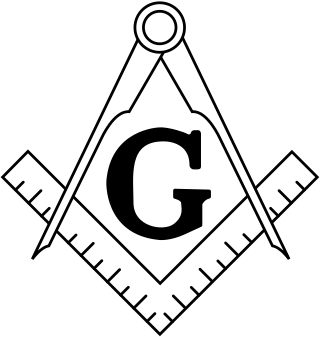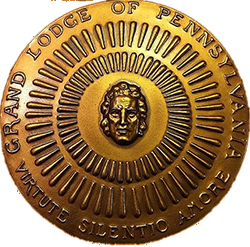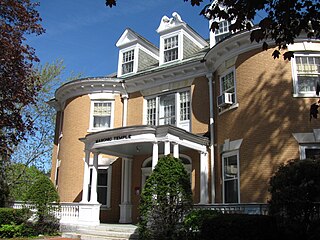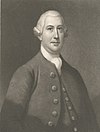
Freemasonry, sometimes spelled Free-Masonry or simply Masonry from 'freestone mason', includes various fraternal organisations that trace their origins to the local guilds of stonemasons that, from the end of the 14th century, regulated the qualifications of stonemasons and their interaction with authorities and clients. Freemasonry is the oldest fraternity in the world and among the oldest continued organizations in history.
The history of Freemasonry encompasses the origins, evolution and defining events of the fraternal organisation known as Freemasonry. It covers three phases. Firstly, the emergence of organised lodges of operative masons during the Middle Ages, then the admission of lay members as "accepted" or "speculative" masons, and finally the evolution of purely speculative lodges, and the emergence of Grand Lodges to govern them. The watershed in this process is generally taken to be the formation of the first Grand Lodge in London in 1717. The two difficulties facing historians are the paucity of written material, even down to the 19th century, and the misinformation generated by masons and non-masons alike from the earliest years.

Joseph Habersham was an American businessman, Georgia politician, soldier in the Continental Army, and Postmaster General of the United States.
The relationship between Mormonism and Freemasonry began early in the life of Joseph Smith, founder of the Latter Day Saint movement. Smith's older brother, Hyrum, and possibly his father, Joseph, Sr. were Freemasons while the family lived near Palmyra, New York. In the late 1820s, the western New York region was swept with anti-Masonic fervor.
Prince Hall Freemasonry is a branch of North American Freemasonry created for African Americans founded by Prince Hall on September 29, 1784. Prince Hall Freemasonry is the oldest and largest predominantly African-American fraternity in the United States.

The Grand Lodge of Pennsylvania, officially The Right Worshipful Grand Lodge of the Most Ancient and Honorable Fraternity of Free and Accepted Masons of Pennsylvania and Masonic Jurisdictions Thereunto Belonging, sometimes referred to as Freemasons of Pennsylvania, is the premier masonic organization in the Commonwealth of Pennsylvania. The Grand Lodge claims to be the oldest in the United States, and the third-oldest in the world after England and Ireland, having been originally established as the Provincial Grand Lodge of Pennsylvania in 1731. This claim is disputed by both the Grand Lodge of Massachusetts and the Grand Lodge of Virginia.
This is a general survey on the historical and modern presence of Freemasonry in countries located in Asia.

The Grand Lodge of Texas, Ancient Free and Accepted Masons is the largest of several governing bodies of Freemasonry in the State of Texas, being solely of the Ancients' tradition and descending from the Ancient Grand Lodge of England, founded on 17 June 1751 at the Turk's Head Tavern, Greek Street, Soho, London. According to historian James D. Carter, the "Grand Lodge of the Republic of Texas, A.F. & A.M." was founded on 16 April 1838. However, its first Grand Master and other grand officers were installed by Sam Houston on 11 May 1838. The Grand Lodge of Texas is one of the largest in the world, reporting 69,099 members in 2019. The current Grand Lodge of Texas facilities were made possible by the fundraising efforts of Waco Masonic Lodge No. 92.
George Handley was an American politician who served as the 18th Governor of Georgia from 1788 to 1789. George Handley was a member of the Society of the Cincinnati of the State of Georgia.

Samuel Hammond was a lieutenant colonel during the American Revolutionary War, governor and leader in the Louisiana and Missouri Territories, and United States Representative from Georgia in the 8th United States Congress.
Freemasonry in Denmark was first established in 1743 and is today represented by a number of Grand Lodges. The oldest and biggest Masonic Grand Lodge in Denmark is the Danish Order of Freemasons, in English also known as the Grand Lodge of Denmark.

The organisation now known as the Premier Grand Lodge of England was founded on 24 June 1717 as the Grand Lodge of London and Westminster. Originally concerned with the practice of Freemasonry in London and Westminster, it soon became known as the Grand Lodge of England. Because it was the first Masonic Grand Lodge to be created, modern convention now calls it the Premier Grand Lodge of England in order to distinguish it from the Most Ancient and Honourable Society of Free and Accepted Masons according to the Old Constitutions, usually referred to as the Ancient Grand Lodge of England, and the Grand Lodge of All England Meeting at York. It existed until 1813, when it united with the Ancient Grand Lodge of England to create the United Grand Lodge of England.

This is a chronology of the formation of "regular" or "mainstream" Masonic Grand Lodges in North America, descending from the Premier Grand Lodge of England or its rival, the Antient Grand Lodge of England. A Grand Lodge is the governing body that supervises "Craft" Freemasonry in a particular jurisdiction or geographical area.
The Grand Lodge of Ancient, Free and Accepted Masons of Nebraska is one of two governing bodies of Freemasonry in the U.S. state of Nebraska. It was established on September 23, 1857. The Grand Lodge of Nebraska is headquartered at Lincoln, Nebraska.

The Grand Lodge of Free & Accepted Masons of Indiana is one of two statewide organizations that oversee Masonic lodges in the state of Indiana. It was established on January 13, 1818. In 2016 the number of Freemasons in the Grand Lodge of Indiana was 55,553 amongst its 394 separate lodges, currently making it the sixth largest Masonic jurisdiction in the U.S. The Grand Lodge of Indiana's offices and archives are located in the Indianapolis Masonic Temple. The historically black Most Worshipful Prince Hall Grand Lodge of Indiana F&AM is the second regular Masonic grand lodge in the state, and it was originally established in 1856 as the Independent Union Grand Lodge of Free and Accepted Masons of the State of Indiana. The two grand lodges agreed to mutual recognition in May 1998, and they jointly share sovereignty over the Masonic fraternity in Indiana.

Masonic ritual is the scripted words and actions that are spoken or performed during the degree work in a Masonic lodge. Masonic symbolism is that which is used to illustrate the principles which Freemasonry espouses. Masonic ritual has appeared in a number of contexts within literature including in "The Man Who Would Be King", by Rudyard Kipling, and War and Peace, by Leo Tolstoy.

St. John's Lodge in Portsmouth, New Hampshire, United States, is the oldest Masonic lodge in New Hampshire and was one of two founding lodges of the Grand Lodge of New Hampshire. It was founded either in 1734 or in 1736 and claims to be the oldest continuously operating Masonic lodge in the Americas, a title also claimed by Solomon's Lodge in Savannah, Georgia, which was founded in 1734.
Solomon's Lodge No. 1 A.F.M. in Charleston is the oldest Masonic Lodge in South Carolina. It was established and organized in 1734, received a Warrant of Constitution from the Moderns' Grand Lodge at London in 1735 and held its first meeting under this warrant on October 28, 1736.















